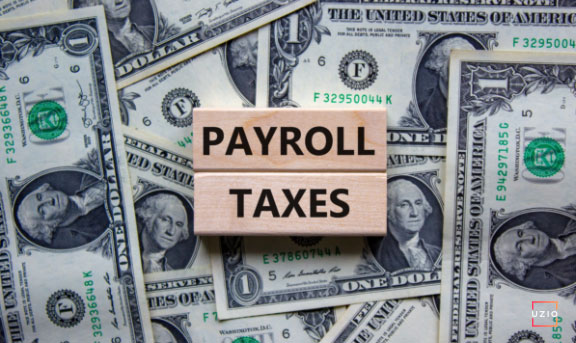How do payroll taxes work in the US? What types of payroll taxes are there? How can small business owners use these taxes to their advantage? Let’s have a look at these payroll taxes in detail, and find out what you need to know about them.
It’s no secret that running a small business can be expensive – there are always new expenses to account for, and tax rates keep rising every year. The total cost of payroll taxes can exceed the cost of your employee’s wages, especially if you hire workers who earn high salaries or work in expensive areas like New York City or San Francisco. As an employer, you’re legally required to pay these taxes to the government on behalf of your employees, so it’s important to understand what they are and how they work before you make any payroll-related mistakes.
The principal types of payroll taxes are associated with: federal, state, FICA, unemployment insurance (UI), and workers’ compensation. Payroll taxes are funds taken out of employees’ checks by employers on behalf of federal and state government agencies. These funds are allocated into different areas; such as Social Security, Medicare, unemployment insurance, and federal income tax withholding.
1. Federal Income Tax
You’ll need to withhold income tax from your employees, as well as from any freelancers or independent contractors who work with you. The federal government requires you to pay Social Security and Medicare (also known as payroll taxes) on behalf of all full-time employees; you must also withhold these taxes from any freelancers or independent contractors that work for you.
2. FICA (Social Security and Medicare)
Employers and employees each pay 6.2 percent on wage income up to $127,200. This is matched by an equal amount paid by employers. Social Security tax is paid half by the employer and half by the employee. Self-employed individuals pay all 12.4 percent themselves. Medicare tax (1.45%) applies only to wages received over $200,000 in a calendar year ($250,000 if married filing jointly). Because benefits are tied to contributions, individuals who do not have sufficient earnings history under Social Security can opt-out of Social Security payments altogether through voluntary withholding agreements.
3. Unemployment Taxes
Employers are responsible for paying federal and state unemployment insurance tax on a portion of each employee’s wages. This money goes into an account to provide temporary income if employees lose their jobs through no fault of their own. The calculation is based on how much employees are paid when they’re paid, and whether or not any advances were made. The more you know about it, however, the better your chances will be at avoiding it: so make sure you understand how unemployment tax works before you hire your first worker.
4. State Payroll Taxes
If you’re a sole proprietor, you’ll pay both state and federal payroll taxes. The amount will vary depending on where your company is located. You’ll also be responsible for withholding money from employees’ paychecks and sending it to local taxing authorities regularly. Different states also have different thresholds when it comes to requiring businesses to pay quarterly or annually; some do not require employers to make any payments at all if they don’t have any employees or if their employees work less than a certain number of hours per year.
5. Worker's compensation
All businesses must pay workers’ compensation insurance. If your company doesn’t have five or more employees, you are considered a sole proprietor and will be responsible for paying self-employment tax in addition to regular income tax. Self-employment tax is a combination of Social Security and Medicare taxes. If you have two or more employees, your company is required to withhold payroll taxes from each employee’s paycheck every payday. Worker’s compensation insurance and federal payroll taxes are paid out-of-pocket by your business while state payroll taxes are deductible as an expense from gross income before calculating federal income tax obligations. Your accountant can help determine which expenses apply to your specific situation so you can maximize deductions while minimizing costs.
6. File your taxes on time
Before you hire a single employee, understand what payroll taxes are and how they apply to your small business. Employers fund these programs through their payroll (employee’s wages). Failure to make payroll tax payments could result in steep penalties and fines levied by both federal and state governments. In most cases, individuals or companies who don’t make required contributions will be liable for paying 100% of that amount, plus interest.
7. Automate your payroll
Save time and money by automating your payroll. With a full-service solution in place, you can set up payroll with just a few clicks online—and even better, when you run payroll through us there’s no need to go through a separate tax filing process. We file all federal and state payroll taxes directly to government agencies on your behalf, so that your employees don’t pay any fines for failing to file their reports.
Schedule a demo with our payroll expert today to learn more about UZIO and get started with a 30 day free trial with no commitments at all.















